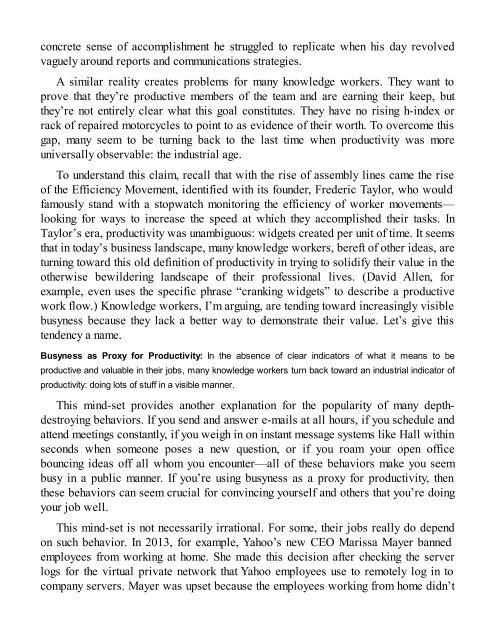Deep Work_ Rules for focused success in a distracted world ( PDFDrive.com )
You also want an ePaper? Increase the reach of your titles
YUMPU automatically turns print PDFs into web optimized ePapers that Google loves.
concrete sense of ac<strong>com</strong>plishment he struggled to replicate when his day revolved<br />
vaguely around reports and <strong>com</strong>munications strategies.<br />
A similar reality creates problems <strong>for</strong> many knowledge workers. They want to<br />
prove that they’re productive members of the team and are earn<strong>in</strong>g their keep, but<br />
they’re not entirely clear what this goal constitutes. They have no ris<strong>in</strong>g h-<strong>in</strong>dex or<br />
rack of repaired motorcycles to po<strong>in</strong>t to as evidence of their worth. To over<strong>com</strong>e this<br />
gap, many seem to be turn<strong>in</strong>g back to the last time when productivity was more<br />
universally observable: the <strong>in</strong>dustrial age.<br />
To understand this claim, recall that with the rise of assembly l<strong>in</strong>es came the rise<br />
of the Efficiency Movement, identified with its founder, Frederic Taylor, who would<br />
famously stand with a stopwatch monitor<strong>in</strong>g the efficiency of worker movements—<br />
look<strong>in</strong>g <strong>for</strong> ways to <strong>in</strong>crease the speed at which they ac<strong>com</strong>plished their tasks. In<br />
Taylor’s era, productivity was unambiguous: widgets created per unit of time. It seems<br />
that <strong>in</strong> today’s bus<strong>in</strong>ess landscape, many knowledge workers, bereft of other ideas, are<br />
turn<strong>in</strong>g toward this old def<strong>in</strong>ition of productivity <strong>in</strong> try<strong>in</strong>g to solidify their value <strong>in</strong> the<br />
otherwise bewilder<strong>in</strong>g landscape of their professional lives. (David Allen, <strong>for</strong><br />
example, even uses the specific phrase “crank<strong>in</strong>g widgets” to describe a productive<br />
work flow.) Knowledge workers, I’m argu<strong>in</strong>g, are tend<strong>in</strong>g toward <strong>in</strong>creas<strong>in</strong>gly visible<br />
busyness because they lack a better way to demonstrate their value. Let’s give this<br />
tendency a name.<br />
Busyness as Proxy <strong>for</strong> Productivity: In the absence of clear <strong>in</strong>dicators of what it means to be<br />
productive and valuable <strong>in</strong> their jobs, many knowledge workers turn back toward an <strong>in</strong>dustrial <strong>in</strong>dicator of<br />
productivity: do<strong>in</strong>g lots of stuff <strong>in</strong> a visible manner.<br />
This m<strong>in</strong>d-set provides another explanation <strong>for</strong> the popularity of many depthdestroy<strong>in</strong>g<br />
behaviors. If you send and answer e-mails at all hours, if you schedule and<br />
attend meet<strong>in</strong>gs constantly, if you weigh <strong>in</strong> on <strong>in</strong>stant message systems like Hall with<strong>in</strong><br />
seconds when someone poses a new question, or if you roam your open office<br />
bounc<strong>in</strong>g ideas off all whom you encounter—all of these behaviors make you seem<br />
busy <strong>in</strong> a public manner. If you’re us<strong>in</strong>g busyness as a proxy <strong>for</strong> productivity, then<br />
these behaviors can seem crucial <strong>for</strong> conv<strong>in</strong>c<strong>in</strong>g yourself and others that you’re do<strong>in</strong>g<br />
your job well.<br />
This m<strong>in</strong>d-set is not necessarily irrational. For some, their jobs really do depend<br />
on such behavior. In 2013, <strong>for</strong> example, Yahoo’s new CEO Marissa Mayer banned<br />
employees from work<strong>in</strong>g at home. She made this decision after check<strong>in</strong>g the server<br />
logs <strong>for</strong> the virtual private network that Yahoo employees use to remotely log <strong>in</strong> to<br />
<strong>com</strong>pany servers. Mayer was upset because the employees work<strong>in</strong>g from home didn’t



